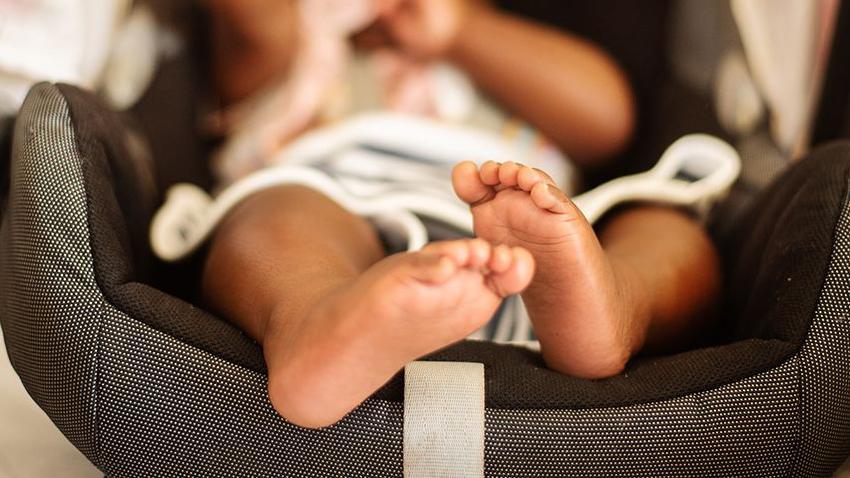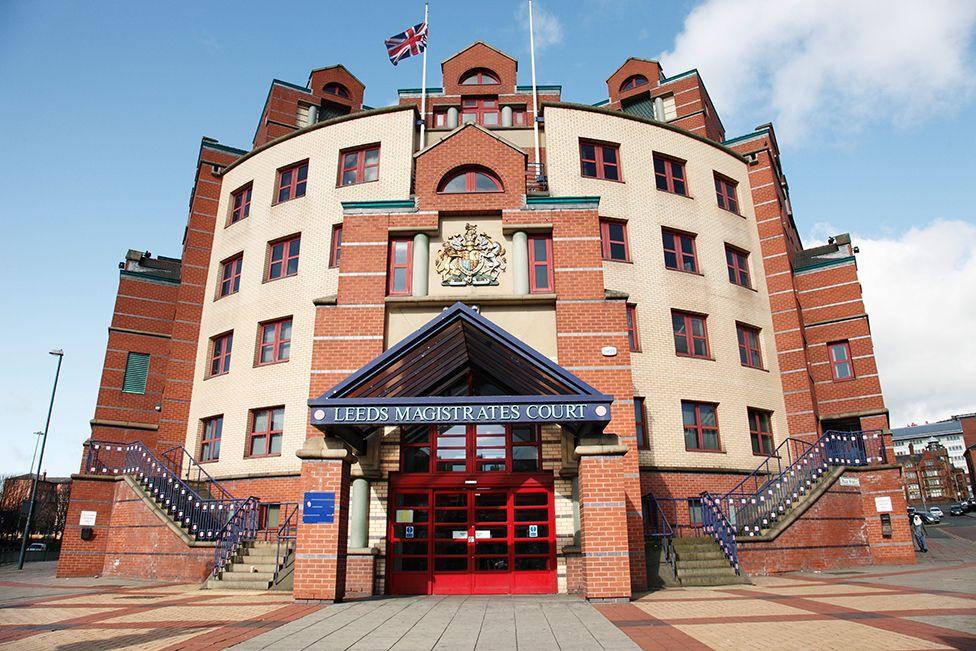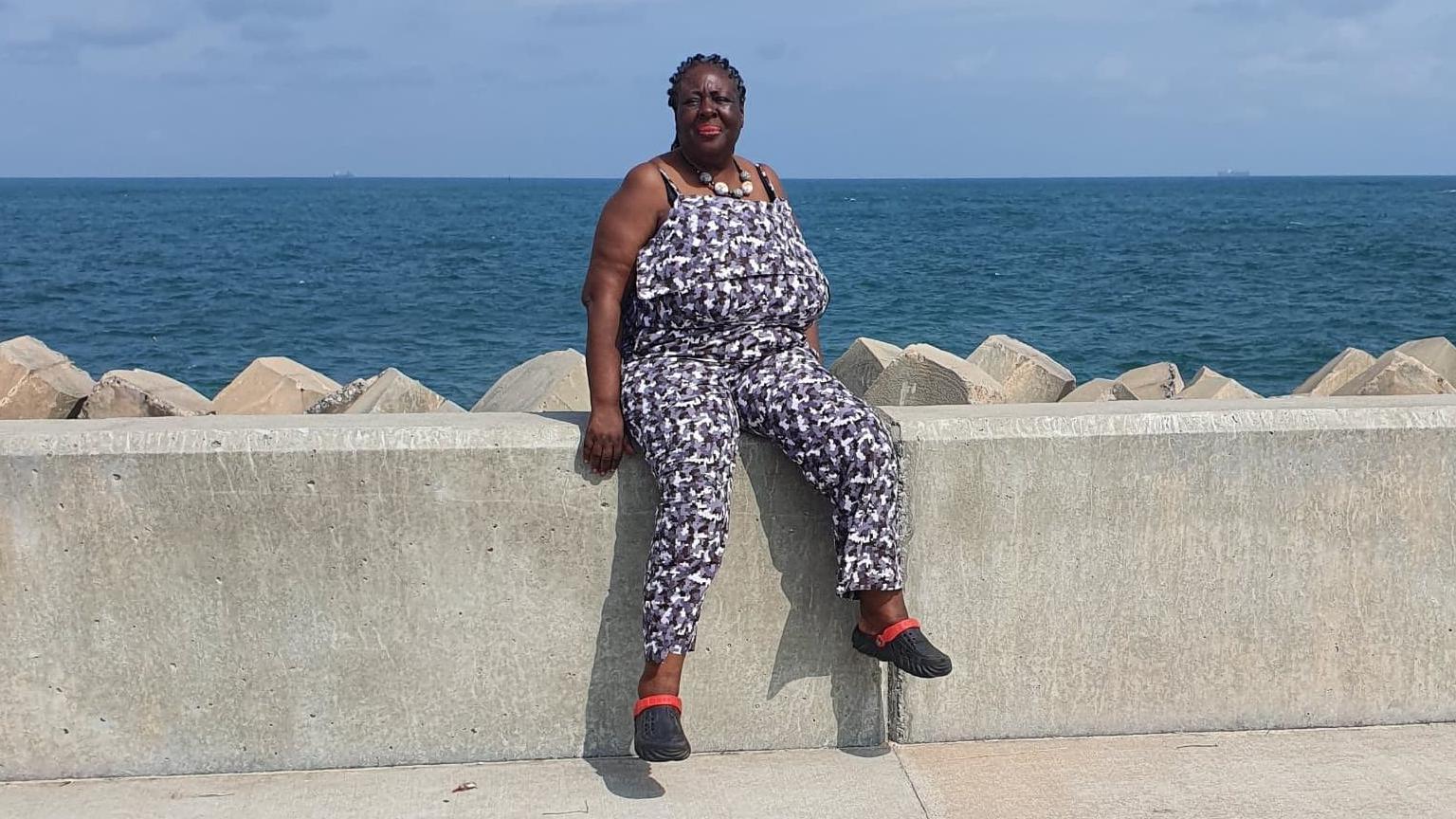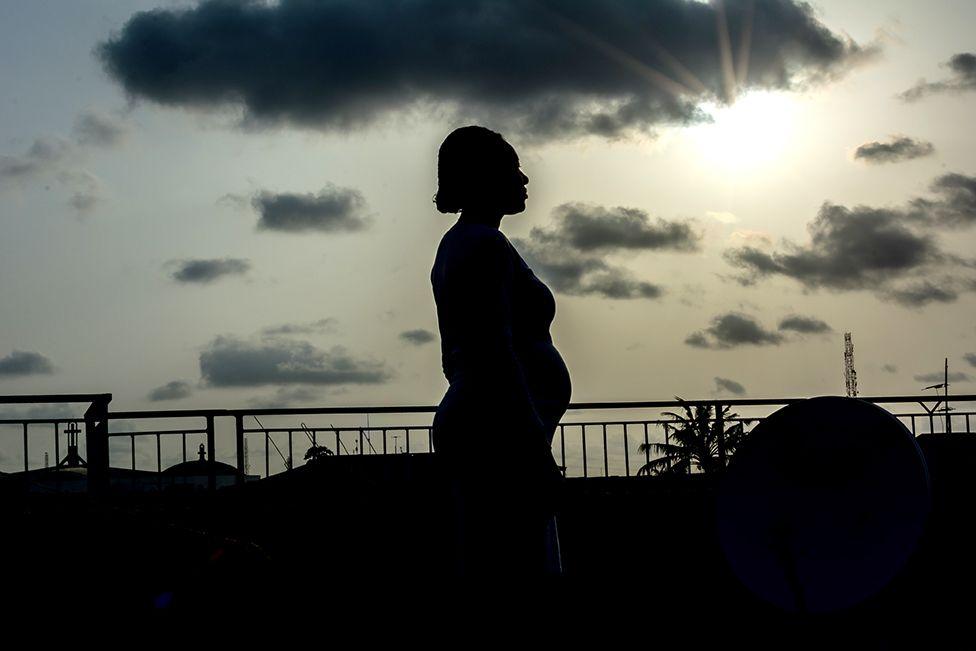Woman smuggled baby into UK using fake birth story

- Published
Last summer, a woman was arrested at Gatwick Airport after she arrived from Nigeria with a very young baby girl.
The woman had been living in West Yorkshire with her husband and children, and before leaving the UK for Africa had told her GP she was pregnant.
That was not true.
When the woman returned about a month later with the baby, she was arrested on suspicion of trafficking.
The case, the second the BBC has followed through the Family Court in recent months, reveals what experts say is a worrying trend of babies possibly being brought to the UK unlawfully - some from so-called "baby factories" in Nigeria.
'My babies are always hidden'
The woman, who we are calling Susan, is Nigerian, but had been living in England since June 2023, with her husband and children.
A careworker with leave to remain in Britain, Susan claimed she was pregnant. But scans and blood tests showed that wasn't true. Instead, they revealed Susan had a tumour, which doctors feared could be cancerous. But she refused treatment.
Susan insisted her previous pregnancies had been invisible on scans, telling her employer, "my babies are always hidden". She also claimed she'd been pregnant for up to 30 months with her other children.
Susan had travelled to Nigeria in early June 2024, saying she wanted to have her baby there, and then contacted her local hospital in Britain, to say she had given birth.
Doctors were concerned and contacted children's services.
Arriving back in the UK with the baby girl - who we're calling Eleanor - Susan was stopped and arrested by Sussex Police.
She was bailed and the lead police force on this confirmed there is no active investigation at the moment.
After her arrest, Susan, her husband, and Eleanor were given DNA tests. Eleanor was taken to foster carers.
"When the results show that I am Eleanor's mother, I want her to be returned immediately," Susan said.
But the tests showed the baby had no genetic link with Susan or her husband. Susan demanded a second test – which gave the same result, and then she changed her story.
She'd had IVF treatment before moving to Britain in 2023 with a donor egg and sperm, she said, and that's why the DNA tests were negative.
Susan provided a letter from a Nigerian hospital, signed by the medical director, saying she'd given birth there, as well as a document from another clinic about the IVF treatment to back up her claims.
She also provided photos and videos which she said showed her in the Nigerian hospital's labour suite. No face is visible in the images and one showed a naked woman with a placenta between her legs, with an umbilical cord still attached to it.

Someone had given birth - it wasn't Susan
The Family Court in Leeds sent Henrietta Coker to investigate.
Ms Coker, who provides expert reports to family courts in cases like this, has nearly 30 years experience as a social worker. She trained in Britain, and worked in front-line child protection in London, before moving to Africa.
Ms Coker visited the medical centre where Susan claimed she'd had IVF. There was no record of Susan having had treatment there - staff told her the letter was forged.
She then visited the place Susan said she'd given birth. It was a shabby, three bedroom flat, with "stained" walls and "dirty" carpets.
There Ms Coker was met by "three young teenage girls sitting in the reception room with nurses' uniforms on".
She asked to speak to the matron and was "ushered into the kitchen where a teenage girl was eating rice".
Ms Coker then tracked down the doctor who'd written a letter saying Susan had given birth there. He said, "Yes, someone had given birth".
Ms Coker showed him a photograph of Susan, but it wasn't her, the doctor said.
"Impersonating people is common in this part of the world," he told Ms Coker, suggesting that Susan might have "bought the baby".

Henrietta Coker has decades of experience as a social worker
The practice of "baby farming" is well known in West Africa, Ms Coker later told the court. At least 200 illegal "baby factories" have been shut down by the Nigerian authorities in the last five years, she said.
Some contained young girls who'd been kidnapped, raped, and forced to give birth repeatedly.
"Sometimes these girls are released," Ms Coker said, "other times they die during childbirth, or are murdered and placed in the grounds of the organisation."
It's not clear where baby Eleanor might have come from – though the doctor told Ms Coker he believed she would have been given up voluntarily.
Ms Coker was unable to establish who Eleanor's real parents are.
She gave evidence to the Family Court in Leeds in March this year, along with Susan, her husband, her employer and a senior obstetrician.
At an earlier hearing the judge asked for Susan's phone to be examined. Investigators found messages which Susan had sent to someone saved in her address book as "Mum oft [sic] Lagos Baby".
About four weeks before the alleged date of birth Susan wrote a text message which read:
"Good afternoon ma, I have not seen the hospital items"
The same day, Mum Oft Lagos Baby responded:
"Delivery drug is 3.4 m
"Hospital bill 170k."
Assuming those sums to be Nigerian Naira, they would be in the region of £1,700 and £85 respectively, the Family Court judge, Recorder William Tyler KC said.

The local authority pointed out the messages were set to "automatic self-destruct mode" – and said they represented evidence of a deal to purchase a baby.
Susan tried to explain the messages in court. The Recorder said her attempts were "difficult to follow and impossible to accept".
Recorder Tyler, sitting as a Deputy Judge of the High Court, found Susan had "staged a scene" which she falsely claimed showed her giving birth to Eleanor in Nigeria.
He said Susan and her husband had put forward a "fundamental lie" to explain how Eleanor came to be in their care, and had tried to mislead authorities with false documents.
They'd both caused the little girl "significant emotional and psychological harm", he said.
In early July, the BBC attended the final hearing in Eleanor's case, held remotely.
In one little square of the Teams meeting we could see Susan and her husband, sitting upright, barely moving, focused closely on what the advocates said.
They wanted Eleanor returned to them. Their barristers said their own children were thriving - they wanted to offer her the same love and care.
Susan's husband saw Eleanor as "a fundamental part of their family unit".
Vikki Horspool, representing the child's guardian, a social worker from the Independent Children and Family Child Advisory Service challenged that. She said that the couple "continued to be dishonest" about Eleanor's real start in life and how she came to be in their care.
The judge ordered that baby Eleanor be placed for adoption, and also made a "declaration of non parentage". He said he was aware of the "pain" this would cause Susan and her husband.
The barrister for the local authority told the court that the baby is "very settled" with her foster carer, taking part in activities in her community and getting medical treatment.
When Eleanor is adopted she will have a new identity and British nationality - but she may never know who her real parents are.
Eleanor's story echoes the case of "Lucy" – who was brought into Manchester Airport in 2023, by a man claiming to be her father.
'Money exchanged for children'
Ms Coker believes it is likely that more children have been brought unlawfully to the UK from West Africa. She told the BBC she has worked on around a dozen similar cases since the pandemic. In her experience, baby trafficking is commonplace.
"Money is getting exchanged for children on a large scale" she said - not just in Africa but "across the global south".
Since 2021 the UK government has restricted adoptions from Nigeria, partly because of "evidence of organised child trafficking" within the country.
British authorities have been aware of the problem for many years, and there have been several cases in the Family Courts over the last 20 years.
Two hearings in 2011 and 2012 involved Nigerian couples who'd had "fertility treatment " that led to a "miracle baby"., external
These "treatments" continue, as recently exposed by investigative journalists at BBC Africa Eye.
In 2013, the UK High Commission in Lagos required DNA tests in certain circumstances before newborn babies could be taken from Nigeria to Britain.
Among 12 couples investigated was a former Oxford academic, prosecuted for immigration offences., external
However this process has since stopped., external In 2018 officials were advised that such DNA testing was unlawful.
They were told they could not make people undergo DNA testing when they were asking for a visa or passport in support of an application relating to immigration status – and that had been the case since 2014.
Ms Coker said some clinics offer "packages" that include registering the baby's birth. It will cost anywhere between £2,000 and £8,000, excluding any airfare, she said.
She thinks more people in Britain should be aware of this activity.
It is hard to tackle, she said - perhaps DNA testing of newborn babies and purported parents would help.
But she wasn't sure the British government can do much to stop it, she said, "the issues start in countries where the children are born".
Patricia Durr, CEO of the anti-trafficking charity ECPAT said cases like this were particularly "heinous" because they denied a child right to their identity.
She said: "Every effort must be made to prevent these egregious crimes occurring."
A government spokesperson said: "Falsely claiming to be the parent of a child to facilitate entry to the UK is illegal. Those found doing so will face the full force of the law.
"Border Force is committed to protecting individuals who cross the border and where concerns are raised, officers will take action to safeguard individuals who could be at risk."
The BBC contacted the Nigerian High Commission for comment but they did not respond.
If you've been affected by issues raised in this story, there is information and support available on BBC Action Line.
More Family Courts reporting from Sanchia Berg
'I had to protect my child from her paedophile dad'
- Published20 November 2023
A mum's 'remarkable turnaround' to win her baby back
- Published8 March 2023

Get our flagship newsletter with all the headlines you need to start the day. Sign up here.